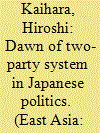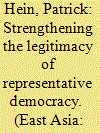| Srl | Item |
| 1 |
ID:
098381


|
|
|
|
|
| Publication |
2010.
|
| Summary/Abstract |
The long rule of the Liberal Democratic Party (LDP) has finally ended, and the Democratic Party of Japan (DPJ) has captured government. This article is to examine why and how that has ended and what are the major factors which have contributed to the change of government. The inability of Japanese opposition parties to capture government has been discussed for a long time. The first part of this article is to examine the strength and weakness of major structural explanations which have been discussed in existing literature. Then, the article proposes a process-level analysis which takes a synergistic effect among institution, strategy and chance seriously. The second part of the article is a short history of the emergence of the Democratic Party of Japan (DPJ) as a ruling party. The history will start with a formation of a small political party in September 1996,and describe how a new single-member electoral system shaped the incentives of political actors, how they worked out political strategy under the new system, and how chance affect the success or failure of political strategy.
|
|
|
|
|
|
|
|
|
|
|
|
|
|
|
|
| 2 |
ID:
098385


|
|
|
| 3 |
ID:
098383


|
|
|
|
|
| Publication |
2010.
|
| Summary/Abstract |
In 1947, Japan became the first East Asian country to introduce democracy, and it was not until four decades later that South Korea completed the democratic transition. Today, surprisingly, South Korea stands out among the East Asian countries as the one that has the most vibrant and politically powerful civil society, whereas in Japan, the role of the nongovernmental organization (NGO) sector in political advocacy is greatly limited. Using historical institutionalism, this paper tries to explain why the NGOs in South Korea and Japan play vastly different roles in political advocacy. It concludes that the different social movement traditions have played important roles in the evolution of the civil societies in Japan and South Korea, and led to the different levels of institutionalization within the NGO sector.
|
|
|
|
|
|
|
|
|
|
|
|
|
|
|
|
| 4 |
ID:
098384


|
|
|
|
|
| Publication |
2010.
|
| Summary/Abstract |
bureaucracy, who acts on behalf of the executive, and party councils. Moreover bureaucrats bypass the legislative Diet process by making rules themselves. This is problematic because it is the lawmakers who are directly held accountable by voters for the enacted legislation risking to be eventually voted out of office. It is suggested that under the given circumstances of strict party discipline, drafting of bills by the bureaucracy and endorsement by party councils, the formal majority rule alone is not sufficient to justify legislative outcomes. The legitimacy factor is introduced to verify in how far individual lawmakers are enabled to initiate and draft floor bills by themselves, discuss bill contents in plenary deliberations and get the public opinion involved. The article attempts to demonstrate that bipartisan floor bills reflect the quest for parliamentary legitimacy and equality among lawmakers across party boundaries. It is suggested that the more legislators participate in drafting and discussing a bill the more legitimate the outcome becomes. The paper screens to this effect several bipartisan bills submitted to the Diet of Japan. Bills such as the NPO law, the law to ratify the Rome Statute for the accession to the ICC, the law to prevent suicide and the law to implement internet filters to protect children are the result of cooperation among lawmakers trying to constrain the interference of the executive or of the powerful bureaucracy. The participation of non-parliamentary agents taking an active part in the legislative process has enhanced the dynamics of representative democracy as well. In the decades of radical ideological confrontation in the 1950s, 60s, and 70s the majority rule risked to become an instrument of coercion. The opposition was compelled to resort to anti-parliamentary obstructionist tactics to derail majority legislation that was rammed through parliament without sufficient plenary deliberation and without taking into account the concerns or viewpoints of the minority. Obstructionism decreased with the LDP co-optation of opposition parties to government responsibility in the 1990s. Opposition for the sake of opposition (communists, DPJ until 2006) and governing for the sake of governing (SDPJ, Komei) have not been honored by the voters. After 2007 the DPJ started to refocus its policies more on ideological differentiation and managed to beat the LDP in the 2009 elections. Recently the work of the Diet has been increasingly put under the scrutiny of international NGOs and legislatures abroad. The unresolved controversial comfort women issue suggests that omission to pass appropriate and timely reconciliatory legislation can cause a serious loss of parliamentary institutional esteem and respect.
|
|
|
|
|
|
|
|
|
|
|
|
|
|
|
|
| 5 |
ID:
098382


|
|
|
|
|
| Publication |
2010.
|
| Summary/Abstract |
This study uses developments in China's urban housing market from 2002 to 2005 to engage with a hypothesis drawn from the Rule of Law discourse, that secure property rights across market participants are necessary for effective market growth. This particular market has been characterized by both significant demand-side growth and weak property rights for private home owners, contradicting the hypothesis. There are various theoretical objections to this hypothesis, but by focusing on a specific market, I isolate key factors to rephrase the hypothesis, emphasising pragmatism and structural market predictability as a substitute for formal and universal property rights. Indeed, formally weak property rights may in this instance have been a partial and temporary driver of market growth.
|
|
|
|
|
|
|
|
|
|
|
|
|
|
|
|